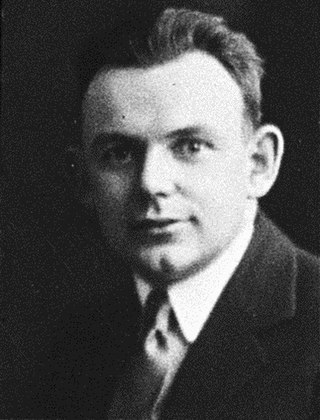Related Research Articles

The 24th New Zealand Parliament was a term of the New Zealand Parliament. It opened on 23 February 1932, following the 1931 election. It was dissolved on 1 November 1935 in preparation for the 1935 election. The 24th Parliament was extended by one year because the 1935 election was held later than anticipated due to the ongoing depression, similarly the 1919, and the 1943 elections were held two years late, having been postponed during World War I and World War II respectively.
Masterton was a New Zealand electorate from 1887 to 1946, focused on the town of Masterton and the surrounding area.

Dunedin North is a former New Zealand parliamentary electorate, which returned one Member of Parliament (MP) to the New Zealand House of Representatives. It was established for the 1905 election and has existed since. It was last held by David Clark of the New Zealand Labour Party, who replaced the long-standing representative Pete Hodgson. It was considered a safe Labour seat, with Labour holding the seat for all but one term (1975–1978) since 1928. In the 2020 electoral boundary review, Otago Peninsula was added to the area to address a population quota shortfall; with this change the electorate was succeeded by the Dunedin electorate in the 2020 election.

George Charles Cecil Black was a member of the House of Representatives for Motueka electorate, in the South Island of New Zealand, initially as a representative of the United Party and from early 1931 as an Independent. He committed suicide and was succeeded as MP by Keith Holyoake.

Waikato is an electorate in the New Zealand Parliament. A Waikato electorate was first created in 1871 and an electorate by this name has existed from 1871 to 1963, 1969 to 1996, and 2008 to the present, though exact borders have often changed.
Hauraki is a former New Zealand parliamentary electorate, from 1928 to 1987 and 1993 to 1996. In the 1987 general election it was renamed Coromandel, the name that had been used from 1972 to 1981. In 1993 it reverted to Hauraki, but became Coromandel again for the first MMP election in 1996.
Gisborne is a former New Zealand parliamentary electorate. It existed from 1908 to 1996, and it was represented by 12 Members of Parliament.
Manukau is a former New Zealand parliamentary electorate in the south Auckland Region. It existed from 1881 to 1978, with a break from 1938 to 1954. It was represented by nine Members of Parliament. Two by-elections were held in the electorate.
Lyttelton is a former New Zealand parliamentary electorate. It existed from 1853 to 1890, and again from 1893 to 1996, when it was replaced by the Banks Peninsula electorate.
Buller is a former New Zealand parliamentary electorate, from 1871 to 1972. It was represented by eleven Members of Parliament.
Mid-Canterbury was a New Zealand parliamentary electorate in rural Canterbury. It existed from 1928 to 1946 and was represented by six Members of Parliament, including Mary Grigg, the first woman National Party MP.
Dunedin West was a New Zealand parliamentary electorate, in the city of Dunedin. It existed for three periods between 1881 and 1996 and was represented by seven Members of Parliament.
Patea is a former New Zealand electorate in south Taranaki. It existed from 1893 to 1963.
Chalmers, originally Port Chalmers, was a parliamentary electorate in the Otago Region of New Zealand, from 1866 to 1938 with a break from 1896 to 1902. It was named after the town of Port Chalmers, the main port of Dunedin and Otago.
The 1932 Motueka by-election was a by-election in the New Zealand electorate of Motueka, a rural seat at the top of the South Island.
Marsden was a former parliamentary electorate, in the Whangarei District and in the Northland Region of New Zealand, which existed from 1858 to 1972. Upon its abolition, Marsden was replaced with the Whangarei electorate.
Wellington North was, from 1905 to 1946, a parliamentary electorate within the area encompassing New Zealand's capital, Wellington. The electorate was represented by four Members of Parliament.
Wellington West was a parliamentary electorate in the western suburbs of Wellington, New Zealand, from 1938 to 1946. It was represented by two Members of Parliament, including Catherine Stewart, the country's second female MP. It was succeeded by the Karori electorate.
Auckland Suburbs was a parliamentary electorate in Auckland, New Zealand from 1928 to 1946.
Manawatu was a parliamentary electorate in the Manawatū-Whanganui region of New Zealand that existed during three periods between 1871 and 1996.
References
- McRobie, Alan (1989). Electoral Atlas of New Zealand. Wellington: GP Books. ISBN 0-477-01384-8.
- Scholefield, Guy, ed. (1940). A Dictionary of New Zealand Biography : A–L (PDF). Vol. I. Wellington: Department of Internal Affairs . Retrieved 13 January 2014.
- Wilson, James Oakley (1985) [First published in 1913]. New Zealand Parliamentary Record, 1840–1984 (4th ed.). Wellington: V.R. Ward, Govt. Printer. OCLC 154283103.